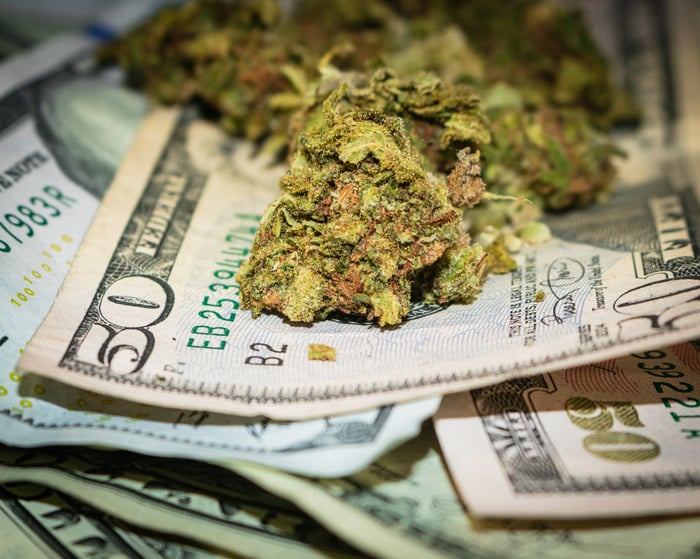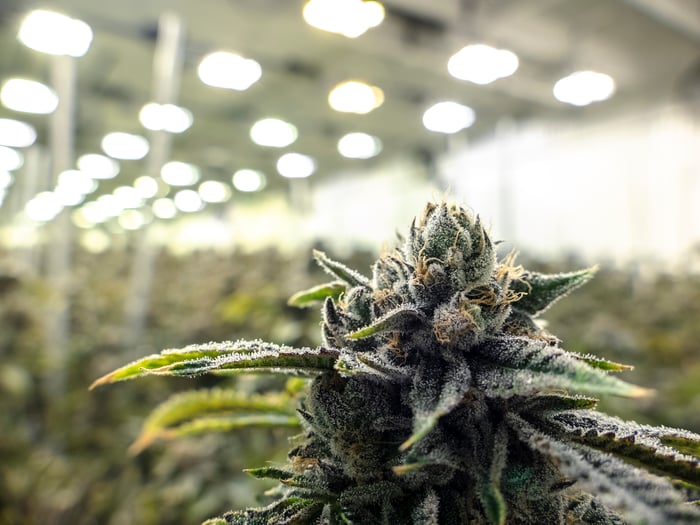Over the past 16 months, investing in the cannabis space has been challenging, to say the least. All next-big-thing investments eventually run into growing pains, and April 2019 marked the beginning of these hurdles for the North American pot industry.
To our north, regulatory-based supply concerns have caused everything from shortages to rampant oversupply, depending on the province. Meanwhile, high tax rates on legal weed in the U.S. has made it very difficult for licensed producers to compete with the black market. As the icing on the cake, access to financing has been troublesome throughout North America.

Image source: Getty Images.
And yet, marijuana remains one of the most promising, high-growth industries of the decade. In the U.S. alone, legal weed sales could triple between 2019 and 2024 to as much as $37 billion, according to the "2020 Marijuana Business Factbook" report from Marijuana Business Daily. It's figures like these that have encouraged the brightest minds on Wall Street to get onboard.
A little over a week ago, on Aug. 14, money managers around the country with at least $100 million in assets under management were required to file Form 13F with the Securities and Exchange Commission. This regulatory form is what discloses the holdings of an asset management firm at the end of the most recent quarter (June 30, in this instance) -- and it's what's allowed investors to see what the top money managers have been up to during one of the most volatile quarters in stock market history.
What stood out as particularly noteworthy was the confidence certain billionaire money managers showed in the cannabis space. Though not every pot stock was adored by billionaire investors (ahem, Canopy Growth) during the second quarter, three stood out as clear favorites of the big-money investment community.

Image source: Getty Images.
Innovative Industrial Properties
In what might be the least surprising reveal of the three, the most profitable cannabis stock on a per-share basis, Innovative Industrial Properties (IIPR -0.65%), saw its aggregate ownership by 13F filers increase nearly 24% to 16.2 million shares from the sequential first quarter. This included a close to 235,000-share add by Larry Fink's BlackRock and a more than 229,000-share buy from Steven Cohen's Point72 Asset Management.
One of the biggest lures to IIP, as the company is known, is that it's an easy-to-understand and low-cost operating model. Innovative Industrial Properties is a real estate investment trust (REIT) that acquires cultivation and processing sites and leases them for extended periods of time (usually 10 to 20 years). Beyond the upfront cost of acquiring assets, maintaining its existing properties doesn't cost much, and these costs are partially or fully offset by annual rental increases and a property management fee.
As of Aug. 20, IIP owned 61 properties in 16 states, with a weighted-average lease length per asset of 16 years. Although the company stopped reporting its average return on invested capital during the first quarter, it looked to be on track for a complete payback of its investments in six years or less.
With demand for cannabis in the U.S. expected to grow significantly in the years that lie ahead, and Innovative Industrial Properties being one of the few cannabis-REITs able to offer sale-leaseback agreements, it's in prime position to continue growing like a weed.

Image source: Getty Images.
GrowGeneration
When I say that professional money managers piled into ancillary marijuana stock GrowGeneration (GRWG -4.68%) during the second quarter, I'm not exaggerating in the slightest. The numbers of shares held by 13F filers skyrocketed 218% to 17.7 million from the sequential first quarter. Notable billionaire buyers include BlackRock (1.95 million shares) and Jim Simons' Renaissance Technologies (353,400 shares).
If you're wondering why hydroponic and organic product retailer GrowGeneration is turning heads, just take a look at the company's recent sales growth. Dating back six quarters, GrowGen has delivered respective year-over-year sales growth of 199%, 172%, 159%, 180%, 152%, and 123%. That's absolutely going to get a company noticed on Wall Street.
This is a company that sells a bit of everything, with nutrients, lighting solutions, and hydroponic systems combining for a little over half of the revenue it generated last year. Currently, GrowGen has 28 retail locations in 10 states, but envisions having 50 open stores in 15 states by the end of 2021. Not to sound like a broken record, but if cannabis sales do triple in the U.S. by 2024, pot companies of all sizes will be looking for ways to improve yield, reduce costs, or expand cultivation capacity, which is great news for GrowGeneration.
As one last note, the coronavirus disease 2019 (COVID-19) pandemic hasn't slowed GrowGen down much, if at all. With cannabis acting like a consumer staple in the U.S., and GrowGen's online business seeing a 149% surge in sales during the second quarter from the prior-year period, it's set to thrive in virtually any economic environment.

Image source: GW Pharmaceuticals.
GW Pharmaceuticals
Lastly, cannabinoid-focused drugmaker GW Pharmaceuticals (GWPH) saw a healthy amount of buying from prominent money managers. Point72 Asset Management added almost 440,000 shares to an existing position, while BlackRock increased its stake by a little over 66,000 shares. In total, 13F filers upped their stake in GW Pharmaceuticals by 13% to 28.7 million shares.
Wall Street's attraction to GW Pharmaceuticals centers on cannabidiol (CBD)-based therapy Epidiolex, which is approved to treat two rare forms of childhood-onset epilepsy and tuberous sclerosis complex (TSC). Based on its $117.7 million in net product sales during the coronavirus-impacted second quarter, Epidiolex has a chance to top $500 million in sales this year.
What's more, following the OK from the U.S. Food and Drug Administration to expand Epidiolex's label to include TSC on July 31, 2020, GW Pharmaceuticals expects to launch its lead drug for this indication this month. TSC provides another stepping stone to help push Epidiolex toward $1 billion in annual sales.
Though GW Pharmaceuticals is not yet profitable, the company has come in with significantly narrower-than-expected losses in each of the past two quarters. This appears to be setting the stage for 2021 to usher in the company's first full year of profits.





